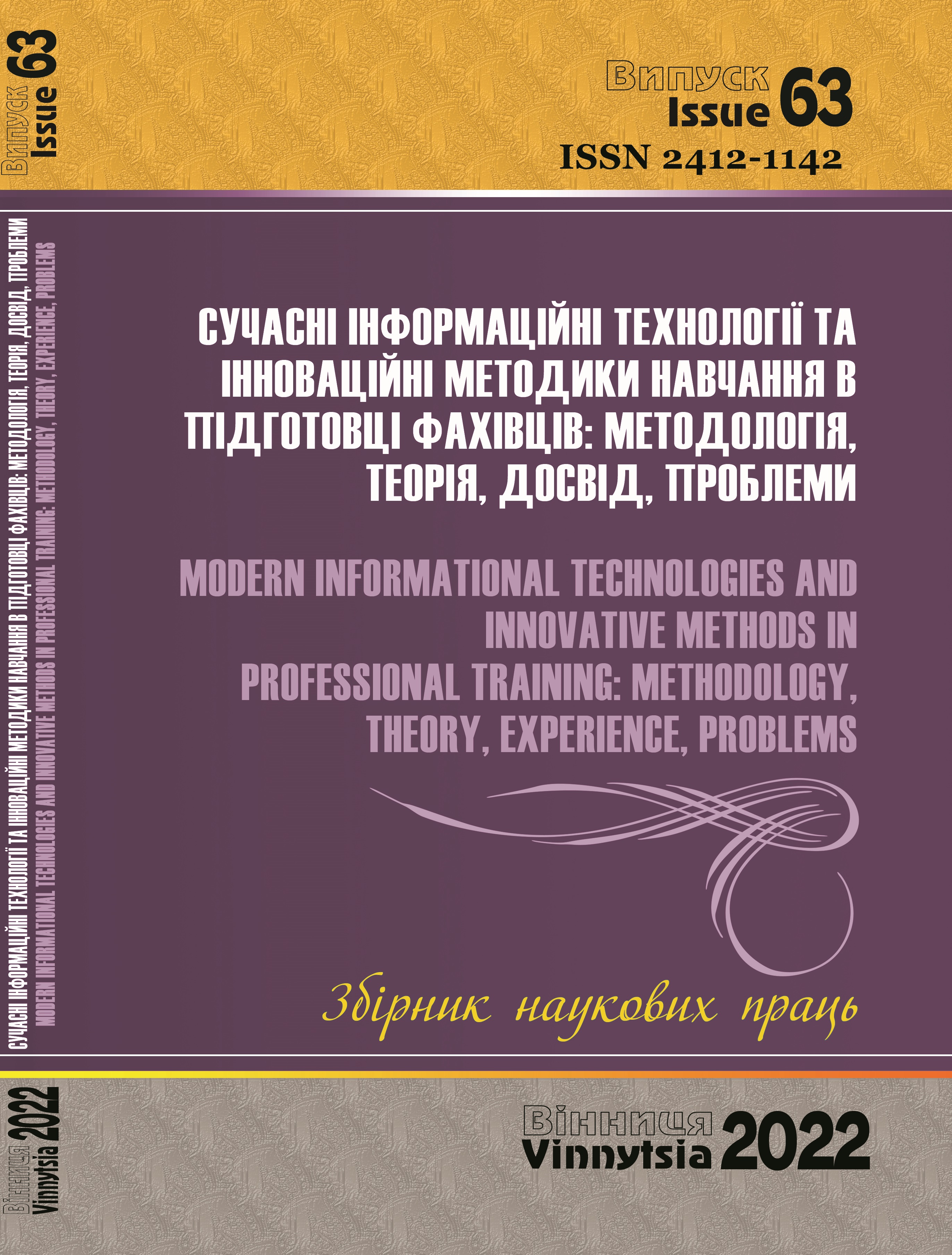USE OF ARTIFICIAL INTELLIGENCE IN FOREIGN LANGUAGE STUDIES BY EDUCATORS
DOI:
https://doi.org/10.31652/2412-1142-2022-63-153-163Keywords:
chatbot, artificial intelligence, foreign language competence, information and communication technologies, multimedia learning technologiesAbstract
The article considers different approaches to the use of artificial intelligence (AI) as
a means of learning a foreign language by students. Theoretical analysis of the researched problem
is carried out and the results of formation of foreign language competence by students with the help
of AI technologies are presented. The peculiarities of the use of artificial intelligence in the study
of foreign language by students are substantiated and the analysis of modern concepts of artificial
intelligence in the process of mastering a foreign language in the perspective of learning, their
essence and role in organizing the educational process.
It is proved that the priority use in the technological component of the methodological system of
active and interactive methods of forming foreign language competence of students with the help
of modern teaching aids creates conditions for personal growth and experience in translating
translation and information problems of future professionals.
The main directions of development of didactic bases of formation of necessary professional
abilities and skills at future experts in the conditions of use of AI in studying of a foreign language
by pupils are defined: the process of training should be organized not only in a zone of actual,
present development, but also taking into account future specialist. In this case, the student has the
opportunity to establish links with existing knowledge and skills that he acquires, as well as with
those skills that need to be mastered. It is noted that to support students' interest in learning a foreign
language, it is necessary to organize the pedagogical process taking into account the conditions of
the innovative environment of the educational institution, thus stimulating the development of their
creativity on the example of their own desire and readiness for new experience.
Downloads
References
Bihych O. B., Strilets V. V. Potential for the use of ict in teaching scientific and technical translation / O. B. Bihych,
V. V. Strilets // Information technologies and learning tools, 2020. – 76(2). – С.86– 95. DOI: https://cutt.ly/yIEAiEw
Gurevich, R. S. Formation of educational information environment for the training of skilled workers in vocational
schools: a monograph. – Vinnytsia: Planer LLC, 2015. – С. 234–271.
Olga Oseredchuk, Lyudmyla Nikolenko, Serhii Dolynnyi, Nataliia Ordatii, Tetiana Sytnik, Tatiana Stratan-
Artyshkova. The Usage of Modern Information Technologies for Conducting Effective Monitoring of Quality in
Higher Education. IJCSNS: International Journal of Computer Science and Network Security, 2022. –
VOL 22 – No1. – 113– 120. Retrieved from https://cutt.ly/DIEP5Wk
Vizniuk I. M. Vprovadzhennia PKKPT v osvitno-informatyvne seredovyshche dystantsiinoho navchannia za
prohramoiu «Macromedia flash» / I. M. Vizniuk // Tekhnolohii rozvytku intelektu, 2019. – T. 3. – 3(24). –
С. 23–46.
Артьомова М.Г., Бедь В.В. Компетентнісний підхід в системі вищої освіти як
пріоритет її модернізації у вищому навчальному закладі. Retrieved from https://cutt.ly/5IEPM7E
Ізмайлова О. А. Формування іншомовної комунікативної компетенції як структурного компоненту
комунікативної культури студентів мовних ВНЗ / О. А. Ізмайлова // Викладання мов у вищих навчальних
закладах освіти, 2010. – No 17. – С. 66–72.
Кадемія М. Ю. Професійно-технічна освіта в інформаційному суспільстві: монографія. Вінниця : Нілан-
ЛТД, 2016. – С. 124– 45.
Штучний інтелект і освіта. Електронний ресурс.. Доступно: https://cutt.ly/CIEAgx5
Візнюк І. М., Буглай Н. М., Куцак Л.В., Поліщук А. С., Киливник В. В. Використання штучного інтелекту в
освіті. Сучасні інформаційні технології та інноваційні методики навчання у підготовці фахівців: методологія,
теорія, досвід, проблеми : збірник наукових праць. – Вінниця : ТОВ «Друк плюс», 2021. – Вип. 59. – С. 14-22.
Downloads
Published
Issue
Section
License
Copyright (c) 2022 Майя Кадемія, Інесса Візнюк, Анна Поліщук, Сергій Долинний

This work is licensed under a Creative Commons Attribution 4.0 International License.

